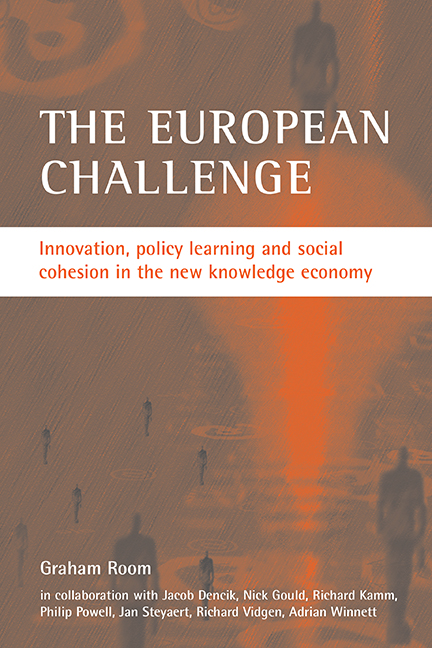Book contents
- Frontmatter
- Contents
- List of figures and tables
- Preface
- one The new knowledge-based economy
- two The EU response
- three Growth and stability
- four Dynamics and innovation
- five Enterprise and organisational change
- six Human investment and learning
- seven Social cohesion and inclusion
- eight Models and measurement
- nine Benchmarking and governance
- ten Globalisation and the knowledge economy
- Endnotes
- References
- Index
one - The new knowledge-based economy
Published online by Cambridge University Press: 18 January 2022
- Frontmatter
- Contents
- List of figures and tables
- Preface
- one The new knowledge-based economy
- two The EU response
- three Growth and stability
- four Dynamics and innovation
- five Enterprise and organisational change
- six Human investment and learning
- seven Social cohesion and inclusion
- eight Models and measurement
- nine Benchmarking and governance
- ten Globalisation and the knowledge economy
- Endnotes
- References
- Index
Summary
New economy, new society?
The closing decade of the 20th century saw widespread claims of economic and social transformation: centred on the new information technologies, but going way beyond technology in its ramifications. To make sense of this transformation, to evaluate its positive and negative consequences and if possible to steer its development became a central priority of public policy makers. It is with some of these efforts that this book is concerned, with particular reference to the European Union.
Claims that the industrial economy was being overtaken by new economic and social forms were of course nothing new. Nor were the hopes placed in technology, as the means of meeting human needs, reducing the need for toil and creating the conditions for social peace. Alfred Marshall, addressing the Cambridge Reform Club in 1873, posed the question as to whether technical progress would eventually make possible a society where heavy physical toil was eliminated and “every man is a gentleman” (Marshall, 1925). In the 1960s liberal writers such as Kerr and Bell – and, more ambiguously, Galbraith – placed similar hopes in the technological dividend to be enjoyed by the market societies of the West (Kerr, 1964; Galbraith, 1967; Bell, 1974). This would be a post-industrial society, with technical knowledge and information a principal driver of progress and its possession the new basis for social and economic power (Kumar, 1995).
Meanwhile other sociologists debated the transition from Fordism to post-Fordism, as the dominant paradigm of production (Jessop, 1991; Amin, 1994). Since the 1970s, the Fordist paradigm had been beset by dysfunctions between its different levels of organisation: worker resistance to the rigidity of the division of labour; globalisation of economic activity creating problems of national regulation; patterns of consumption which, being more varied, could not be satisfied by mass production. Computer-based technologies would enable the organisational networking and core-periphery reconfiguration that the post-Fordist production paradigm required. The next ‘long wave’ of development would therefore have the new information technologies at its heart: reshaping markets, spawning new industries and revolutionising the management of space and time.
- Type
- Chapter
- Information
- The European ChallengeInnovation, Policy Learning and Social Cohesion in the New Knowledge Economy, pp. 1 - 10Publisher: Bristol University PressPrint publication year: 2005



